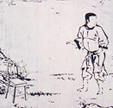Non-Remembrance of Things Past
Owen’s connection to the assassination is too complex to relate here. But essentially, evidence indicated that Owen had a pre-existing relationship with Sirhan Bishara Sirhan, the man falsely convicted of killing Senator Kennedy. Owen had arranged to meet Sirhan outside the Ambassador Hotel on the night of the murder, ostensibly to sell him a horse. Bugliosi managed to bring out some information about Owen, but Crickard effectively prevented disclosure of key details. Bugliosi noted in his closing argument for KCOP that:
we are talking about a conspiracy to commit murder, a conspiracy to assassinate someone who was a major candidate for the presidency of the United States, a conspiracy the prodigious dimensions of which would make Watergate look like a one-roach marijuana case.
In fact, before the trial, when another judge had ordered a review of the ballistics evidence in R.F.K.’s death, Bugliosi told the press:
Gentlemen, the time for us to keep on looking for additional bullets in this case has passed. The time has come for us to start looking for the members of the firing squad that night.
Vincent Bugliosi had no trouble recognizing a cover-up in Senator Kennedy’s assassination. And he learned that searching for the truth brought ridicule, not praise. A few weeks after the Owen vs. KCOP trial, he announced his candidacy for district attorney, pledging to uncover the facts in Robert Kennedy’s murder. The Los Angeles Times opposed him, claiming that “Bugliosi believes he has an emotional issue that he can exploit” in his quest for office. Bugliosi lost the election.
Three decades later, Bugliosi has redeemed himself; and he is no longer a conspiracy buff. This year, he published Reclaiming History: the Assassination of John F. Kennedy. Weighing in at 1,612 pages, Reclaiming History is nearly twice as long as the Warren Report on President Kennedy’s murder. Drawing out the lie at greater length, however, doesn’t make it true. It remains an embarrassment of errors, omissions, and faulty reasoning.
 Bugliosi appeared on the Colbert Report (6/21/2007) to promote his work, and he began by listing a number of “facts” which are simply not facts at all. And since Bugliosi is convinced that alleged assassin Lee Oswald acted alone, I couldn’t help wondering how he explains C.I.A. officer Everette Howard Hunt, Jr.’s confession in the J.F.K. murder. Alas, the topic never came up. Colbert cracked jokes; and Bugliosi responded in kind, calling Colbert a “clone of Oliver Stone.”
Bugliosi appeared on the Colbert Report (6/21/2007) to promote his work, and he began by listing a number of “facts” which are simply not facts at all. And since Bugliosi is convinced that alleged assassin Lee Oswald acted alone, I couldn’t help wondering how he explains C.I.A. officer Everette Howard Hunt, Jr.’s confession in the J.F.K. murder. Alas, the topic never came up. Colbert cracked jokes; and Bugliosi responded in kind, calling Colbert a “clone of Oliver Stone.”It was an odd remark considering Bugliosi’s work on the assassination of Robert Kennedy. Maybe, I thought, Stone is a clone of Bugliosi! — the young Bugliosi who recognized when a case was fixed.
__________
For an extensive account of Oliver Owen and Bugliosi’s role in the case, see The Assassination of Robert F. Kennedy: the Conspiracy and Coverup, by William Turner and Jonn Christian. It is full of information on the crime and praise for Bugliosi. Has Vincent forgotten the Walking Bible?
Sometimes, coincidences seem to stretch out forever, don’t they? For example, Oliver Owen had a friend named Gail Aiken. One of her brothers was William Bremer, Jr., who was convicted of a confidence swindle. His lawyer was Ellis Rubin. Rubin later represented Frank Sturgis, Bernard Barker, Eugenio Martinez, and Virgilio Gonzalez after they were caught in the Watergate Hotel.
Gail had another brother, Arthur, the man who shot presidential candidate George Wallace in 1972. Everette Howard Hunt, Jr., of J.F.K. assassination fame and another Watergate burglar, was sent to search Arthur’s home after the shooting to find evidence implicating the Democrats. But Arthur Bremer turned out to be merely another lone nut seeking fame. Like Lee Oswald and Sirhan Sirhan, Arthur Bremer supposedly really wanted to kill Richard Nixon, but settled for another victim instead. It’s amazing how many lone assassins in America wanted to kill Richard Nixon but ended up killing somebody else.
____________________
Labels: Everette Howard Hunt, John Kennedy, Robert Kennedy, Vincent Bugliosi, Warren Commission



